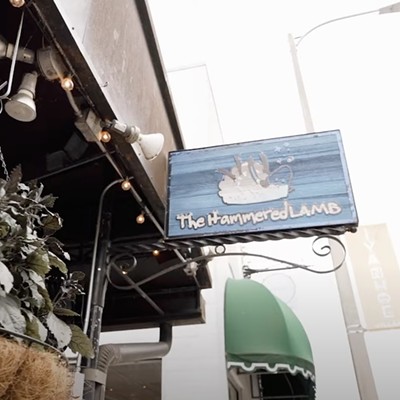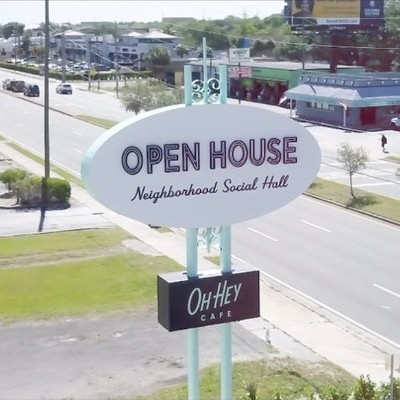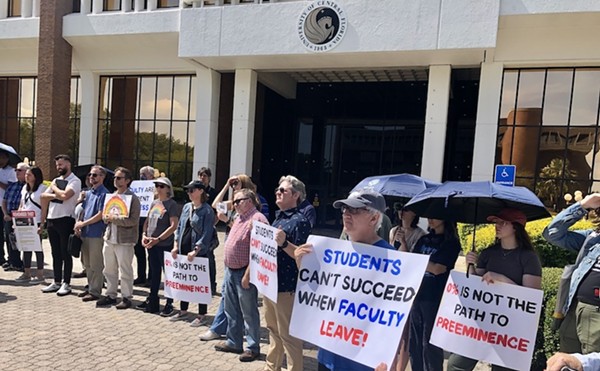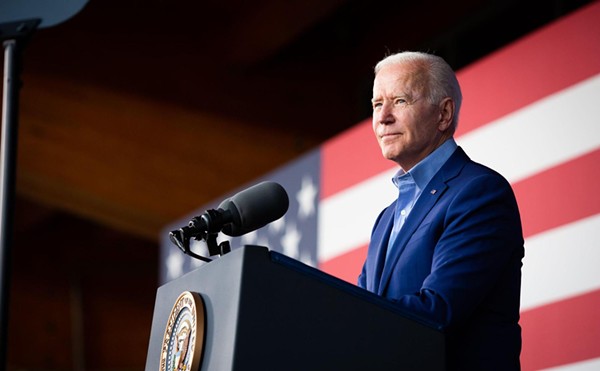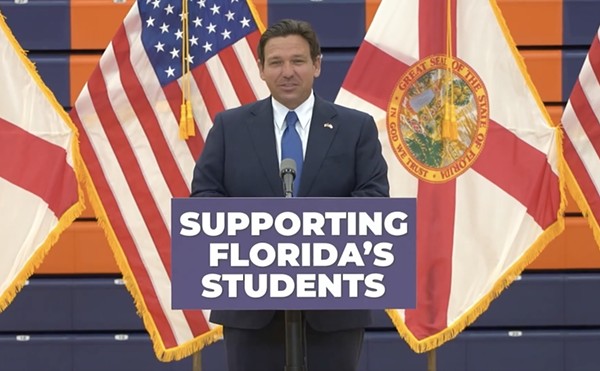Anyone looking for a sign that the two new members of Orlando's City Council will be the mayor's handmaidens should observe how they handled a flap over invitations to their June 1 swearing-in.
It seems the city provided Vicki Vargo and Patty Sheehan each with a mere 25 invites to the most important ceremony of their young political lives. "Twenty-five won't even cover my family," says Sheehan, who has many relatives living in Orlando.
Perhaps Vargo and Sheehan would have been more accepting of the number allotted by City Hall if they hadn't discovered how many invitations Mayor Glenda Hood was sending out to her third swearing-in. Hood required 100 times as many announcements as the two commissioner-elects. She was sending out 2,500.
So Vargo and Sheehan made another request, persuading the city to ante up another 35 announcements each.
"It's unfortunate, because I want to start out on a positive foot with the mayor," Vargo says. "Then this happens prior to taking oath. It sends the wrong message. It's unfortunate that the mayor's office didn't think about that a little more."
This is the kind of gumption longtime City Hall observers say Sheehan and Vargo, who won in their districts despite Hood's endorsement of their opponents, will display at council meetings. The prevailing wisdom is that Vargo and Sheehan won't line up in the mayor's pecking order because they owe her nothing.
"Basically we'll see differences in the way they do business," says Tom Jaeger, president of the College Park Neighborhood Association, in Vargo's district. "They will listen to the desire of the voter."
That remains to be seen. Under Hood's previous stewardship, as well as that of her predecessor, Bill Frederick, commissioners rarely bucked an administration's recommendations. Frederick, for example, never had to exercise the mayor's veto power in his 12 years in office.
But with Sheehan and Vargo joining three sitting commissioners who opposed Hood in the March 14 election, politicos anticipate the mayor now will receive little, if any, support for projects close to her heart, such as a downtown performing-arts center.
If city government has reached the point where the council blocks Hood's every move, the mayor has nobody to blame but herself. She was too willing to push through light rail, the most polarizing issue to hit Orlando in the last decade. In the fallout, commissioners Don Ammerman, Betty Wyman and Ernest Page endorsed a council colleague, Bruce Gordy, for mayor.
Though Gordy lost, he took some of Hood's political clout down with him. "The council started thinking, ‘Hey, there's six of us and one of her,'" says Sheehan, a self-described "liberal, lesbian Democrat" who defeated incumbent Bill Bagley by 138 votes in the March election. "They thought, ‘We're taking a lot of heat and putting our political careers on the line for light rail,' which they felt was a sinking ship. ‘We're not going to do this, we're going to vote against it, we have the power to override this.' Unfortunately, they were portrayed as these evil people trying to hurt the mayor."
Whether Sheehan and Vargo align themselves against Hood will be much watched in the next few months. So will the actions of those council members who backed Hood's opponent. "I do hope we can all get along," Wyman says.
Sheehan and Vargo arrive as independents, which both say means being independent of the mayor, other commissioners and the media. (Neither was endorsed by the Sentinel.) But they also consider themselves independent of the roles they are expected to play -- independent to just about everybody except their constituents.
"It's not the commissioners versus the mayor," says Vargo, a real-estate attorney who is taking over the seat left by Gordy. "The council will be driven by issues rather than personalities. Spending priorities will be a big issue."
As for light rail, she says, "It's a dead issue. It doesn't merit discussion because we're moving on to other transportation options."
What does merit consideration is that, to Vargo and Sheehan, they represent the new Orlando, residents who don't have generations of family in this city but are still concerned about its future and vitality.
Says Vargo: "When I look at myself, quite frankly, I really am neutral and independent because I don't know anybody. I don't have any old alliances. When people walk through my doorway, no matter who they are, they are on equal ground, which I think is great for the city of Orlando."
Of the two council newcomers, Vargo, 46, is more no-nonsense in her approach, more methodical, more businesslike, more likely to have a website. She takes thoughtful pauses before answering questions and often responds in a measured cadence. On the afternoon we met, she was tired. Her hands hardly ventured from a Styrofoam cup of coffee, which she rarely drinks in the middle of the day.
Sheehan, meanwhile, is a flurry of activity. The UCF art graduate -- she now works as a statistician for the state's agriculture department -- is more likely than Vargo to crack a joke and often punctuates her comments with a laugh. When speaking, her hands gesture in different directions as she moves easily, often without provocation, from subject to subject. The 38-year-old is, very obviously, a people person. "`Vargo` can detach better than I can," says Sheehan, who was born in Cleveland, Ohio. "I'm more emotional. Sometimes that serves me, sometimes it doesn't."
Born in Grand Haven, Mich., Vargo moved to Tampa by herself when she was 21 because she wanted to live in a warmer climate. She later enrolled at the University of South Florida as a business administration major (with an emphasis on finance), thinking she'd follow her mother into banking. Instead, she went on to the University of Florida law school.
Vargo says two things enticed her into public office. The first was a series of planning seminars she attended as president of the Rosemont Homeowners Association, after which "I decided I would employ the knowledge I'd been given," she says.
The other thing was the neighborhood activists who kept telling her she would make a good commissioner when Gordy stepped down. "I thought I had two to six years," she says. "He surprised me `by quitting to run for mayor`. But I was ready nonetheless."
Her main campaign issue was public safety. She'd like to find money in the city's $209 million budget to add more than 60 police officers on the streets. "We are losing a bunch of experienced police officers, particularly in the area of patrols," she says.
How will the city pay for new officers?
By removing funds from vacant jobs the city no longer needs, she says.
"It's my understanding that the budget includes dollars for positions currently not filled, which may never be filled, some of which are outsourced or have been eliminated but never officially taken off the books," she says. "The city never eliminated the positions so those departments have inflated budgets. We need to identify those positions that have been eliminated and apply those dollars to law enforcement. If we are going to fill those positions, then we need to do that. But if not, then it leaves this discretionary fund for whomever to tap. And I want it to reinforce neighborhood patrols."
How much money is she talking about?
"Potentially millions," Vargo replies.
Another area of concern is the council's consent agenda, a list of presumably routine matters the council approves as a single vote. Hood critics have charged for years that the mayor often places innocuous-looking items on the consent agenda, costing taxpayers big bucks without inviting scrutiny. Then, as if on a dare, commissioners are made to investigate each item to measure its importance, like locating the proverbial needle in the haystack. For example, at the April 3 council meeting, more than 100 items were listed on the consent agenda -- a list that commissioners had only one weekend to look over.
"I'll be looking closely at the consent agenda," Vargo says, "because there might be something on there I don't consent to."
Like Vargo, Sheehan has been busy since her election, though in her own distinct way. Where Vargo has been, perhaps, more studious, Sheehan has been raising a little hell.
A group of parents from Howard Middle School asked Sheehan for some help. They wondered if she could work a deal with City Hall that would allow the Robinson Street school, which is soon to be renovated, to park portable classrooms at the city-owned Festival Park. That park was larger than the athletic field across the street from the school, and had buildings nearby in case of weather emergencies.
Sheehan checked with Richard Levey, Orlando's chief administrative officer, who told Sheehan the trailers would interfere with a Hispanic festival thrown each summer at the park. The political fallout from that could be terrible, Levey told Sheehan.
Levey referred Sheehan to Wyman, who has contacts with the group that hosts the festival. But Wyman hadn't been notified by Levey's office. She had no opportunity to discuss relocating the party with the Hispanic group.
Sheehan pointed this out to Levey, who offered as a consolation that the displaced students could use Festival Park for phys ed class. "Great," Sheehan says. "At least we got something."
But that's not the end of the story. Sheehan subsequently received a letter from a city attorney stating that her meeting with Wyman violated the state's Sunshine laws. How could she be breaking laws for elected officials when she hadn't even been sworn in yet?
"This was a playground for children," Sheehan says. "This wasn't some evil, horrible thing. If I have to go to jail, I'll do that. But if they're so concerned about the Sunshine, why don't they have better televised broadcasts, with better cameras, so the public has the ability to get better information? ... If you want Sunshine, then let's do it all the way."
Like Vargo, Sheehan is interested in preserving Orlando's neighborhoods -- two relative newcomers who want what's left of Orlando's heritage to remain in place.
Vargo, for example, would like to have seen the trotters remain at Ben White Raceway. "That's one of the first sports to `exist` in Orlando," she says. "Old Orlando wants to get rid of it. I want to keep it in spite of the fact that I'm a newcomer."
Sheehan, meanwhile, remains vigilant against apartments and tandem housing in Orlando's downtown neighborhoods. "If someone wants to live in the 'burbs, that's fine," she says. "But my neighborhood is unique. I have neighbors that come by and sit on my front porch and talk. It's a community feeling. Let's do what we can to protect that."
As for her groundbreaking status as the city's first openly gay elected official, Sheehan downplays the significance. "I barely have time to be gay," she says.
Sheehan criticized Bagley during the campaign for not fully grasping the need for city government to extend nondiscrimination protection in hiring and housing to homosexuals. Sheehan has signed a pledge of her own, saying she won't discriminate. But she stopped short of saying she'd take the lead in writing an anti-discrimination resolution.
For one thing, a task force is already working on one, she says. For another, she doesn't want to be "just a gay commissioner."
"We need to have a community-wide effort," she continues. "People in the community have to find some way to put it together and bring it before council."
It's this kind of outlook that has neighborhood groups excited about the new council. Almost all the commissioners have been head of a neighborhood association at one point in their lives, but have often voted as council members in a way that wasn't perceived as neighborhood-friendly.
"There's a number of issues coming up we feel so much more positive about," says John Sharkey, who took over as president of the Colonialtown Neighborhood Association from Sheehan, but whose council representative will be Vargo.
Sharkey says his association had been considering whether to ask the City Council to redraw the council districts so that Colonialtown is no longer cut in two. For the last four years, Bagley has represented half of the neighborhood's 1,700 homes, with Gordy representing the other half.
"Now we're thinking we might want to keep this double representation," Sharkey says. "The dynamics have changed so much."
Among the issues he'll be pushing for is a moratorium on the use of billboards on streets like Mills and Bumby avenues. Colonialtown is trying to make itself more pedestrian-friendly for businesses. Billboards distract drivers' eyes from the road, Sharkey argues.
He's waiting to see how the new council reacts. "With the previous board," he says, "you didn't feel like they were hearing your cause and helping you get there."


